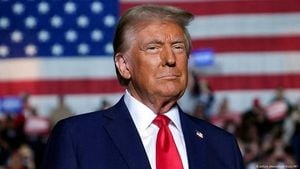In a stunning turn of events, Australia's 2025 federal election saw the ruling Labor Party, led by Prime Minister Anthony Albanese, secure a historic second term, marking the largest majority since World War II. This election, characterized by significant voter support for climate action and economic reform, has reshaped the political landscape and set the stage for the government's ambitious agenda.
Labor's victory comes amidst ongoing economic challenges, with Australians having lost over a decade of real wage growth since the last election in 2022. According to Adam Triggs, more than 10 years of real wage stagnation has left many voters frustrated. "Australians have lost more than 10 years of real wage growth since the last election [in 2022]," he noted, underscoring the economic pressures that influenced the election outcome.
Despite these challenges, Labor's platform resonated with voters, particularly Millennials and Generation Z, who prioritized climate change as a key issue. A staggering three-quarters of these younger voters identified climate action as a top-tier concern, demonstrating a fundamental shift in Australian politics. The ALP's commitment to renewable energy and climate initiatives has positioned it as the most trusted party to address climate concerns, holding a 17 percentage point lead over the Coalition.
Labor's ambitious policies include a pledge to invest $8.5 billion over four years in Medicare, expand bulk-billing incentives, and commit $10 billion to build 100,000 homes for first-time buyers. Additionally, the government will introduce tax cuts that will save the average taxpayer approximately $10 per week starting in 2026, alongside a $75 credit to be applied to household electricity bills.
As part of its healthcare initiatives, Labor plans to fund the upgrade of Midland's public hospital with $200 million, complemented by another $155 million from the state government. Furthermore, the government has committed $9.7 billion to major transport projects, including the completion of the Metronet passenger rail line extensions and significant upgrades to Perth's Tonkin Highway.
Labor's focus on economic reform extends to education, with an additional $785 million earmarked for upgrading public schools in Western Australia over the next four years. The government also plans to offer 100,000 fee-free TAFE places annually starting in 2027, benefiting around three million Australians.
However, the election results were not without controversy. Outgoing Liberal senator Linda Reynolds criticized her party's campaign as a "comprehensive failure," attributing the loss to the party's male dominance and failure to resonate with mainstream Australia. She voiced support for current deputy leader Sussan Ley to take over leadership from Peter Dutton, stating that Ley would be a "great and very healing leader for our party." Reynolds emphasized the need for the Liberal Party to engage in hard conversations about gender balance and diversity.
In the wake of Labor's success, the Coalition faces a daunting task of rebuilding its credibility, especially regarding climate and energy policies. The Federal Coalition's sweeping defeat indicates that it may remain unelectable until it advances credible climate initiatives. The ALP's strong mandate allows it to roll out more renewable power and storage, better regulate polluters, and set new, stronger climate targets.
Notably, the election results also reflect a significant shift in voter priorities, with pro-climate independents gaining ground and the Australian Greens likely to hold the balance of power in the Senate. This newfound influence may pave the way for stronger climate laws and a more progressive policy agenda in Labor's second term.
As the Albanese government prepares to implement its ambitious plans, it will also need to navigate the complexities of international relations. The recent re-election of Donald Trump as U.S. president has raised questions about the future of the Australia-U.S. alliance. Albanese has expressed caution regarding diverging Australian and U.S. interests, emphasizing the need for a strategic reorientation in foreign policy.
Polling indicates that while Australians remain broadly supportive of the U.S. alliance, there is growing skepticism about its reliability as a partner. The Albanese government will need to engage in a nuanced approach to foreign relations, focusing on building partnerships with middle powers in the region and globally.
In conclusion, the 2025 federal election marks a pivotal moment in Australian politics, with Labor's resounding victory signaling a strong mandate for change. As the government embarks on its ambitious agenda, the challenges of economic reform, climate action, and international relations will define its second term. With a commitment to addressing the pressing issues facing Australians, the Albanese government is poised to reshape the nation's future.





